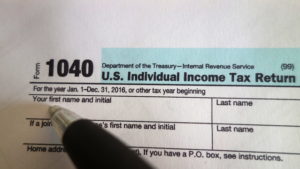
Tax returns, now a presidential campaign issue
House Democrats yesterday formally requested Donald Trump‘s 2013 through 2018 personal tax returns, as well as the tax returns of eight Trump business entities, from the Internal Revenue Service. At the same time, an increasing number of Democratic presidential candidates have already released multiple prior years of tax returns, but U.S. Senator Bernie Sanders remains the outlier.
The reason for requesting presidential candidates’ tax returns comes down to one word: transparency. According to McClatchy DC, “[t]he returns provide voters a look into the personal finances and charitable contributions of candidates and gives insight into whether he or she has any potential conflicts of interest.” Paraphrasing Joseph Thorndike, author and Director of the Tax History Project at Tax Analysts, McClatchy indicates that, “[w]ithout the full returns, voters can’t see such items as sources of income, which tax breaks they claimed, what they might have deducted as business expenses or how much they gave to charity.” Accordingly, while releasing tax returns is not required by law, it has become a tradition for presidential candidates to do so since Richard Nixon in the early 1970s.
The 2016 elections illustrate the problem with candidates failing to provide their tax returns. Donald Trump refused to release his returns, claiming that he was under audit by the I.R.S. In fact, even if Trump’s returns were being audited, he could have released them, as Nixon did. In contrast, Hillary Clinton set the gold standard in 2016, releasing eight years worth of tax returns, on top of the returns she and her husband had previously released, for a total of at least 30 years. Clinton challenged her rival for the nomination, Bernie Sanders, to release his tax returns, and members of the press also made the request, but Sanders instead gave a series of excuses. First, in early April 2016, Sanders said, “my wife does our tax returns … but we will get out all of that information as soon as we can.” When Sanders’ wife Jane was asked about their taxes less than two weeks later, she said that the prior years’ tax returns were at home, and that she and her husband would release them in full when they got home for a break from the 2016 campaign trail. And again a few days later, when asked about the tax returns in a debate against Clinton, Sanders said, “we will get ’em out. We’ll get ’em out very shortly.” However, such release of multiple prior years of tax returns did not happen. Instead, Sanders released just one abbreviated summary tax return, for 2014. At the same time, Sanders used the information from Clinton’s tax returns to bash her for giving paid speeches.
And now, in 2019, we see the results of this 2016 failure of transparency. Donald Trump’s foreign policy keeps benefiting Russia, and we want to know why. Trump may have committed bank fraud with the assistance of Deutsche Bank, and we want to know more. The Trump family businesses, including Ivanka Trump, who also holds an official government title as Advisor to the President, may be one big criminal enterprise. As Trump does “deals” with countries from Russia to China to Saudi Arabia, and threatens military conflict with countries such as Iran and Venezuela (note the oil connection that again benefits Russia), we still do not know whether or to what extent his personal business dealings may benefit or be affected by such decisions.
In response, last year, U.S. Senator Elizabeth Warren set the new gold standard. Even before announcing her presidential candidacy, Warren released her previous 10 years of tax returns, and posted them online. Warren has also proposed that candidates for federal office, including presidential and Congressional candidates, likewise release their multiple prior years of tax returns. Thus far, several of Warren’s fellow Democratic presidential candidates, new to the campaign, have already followed suit. These include Jay Inslee, Kristin Gillibrand, and Amy Klobuchar. However, Bernie Sanders, now running in his second consecutive presidential campaign, still has not provided his tax returns. He continues to say, after being asked since 2016, that he will release them “sooner than later.” This puts the Democrats in a weaker position, as Trump could conceivably say, “why should I release my tax returns when Sanders hasn’t released his?” Indeed, it would be a very problematic 2020 campaign theme for the Democrats to have to say: “Vote Democratic: We’re Just As Bad As Trump.”
One thing seems likely, therefore: this time around, a presidential candidate’s refusal to be transparent is no longer going to fly.
Photo by Senior Guidance, used under Creative Commons license. https://is.gd/BLCIBT


